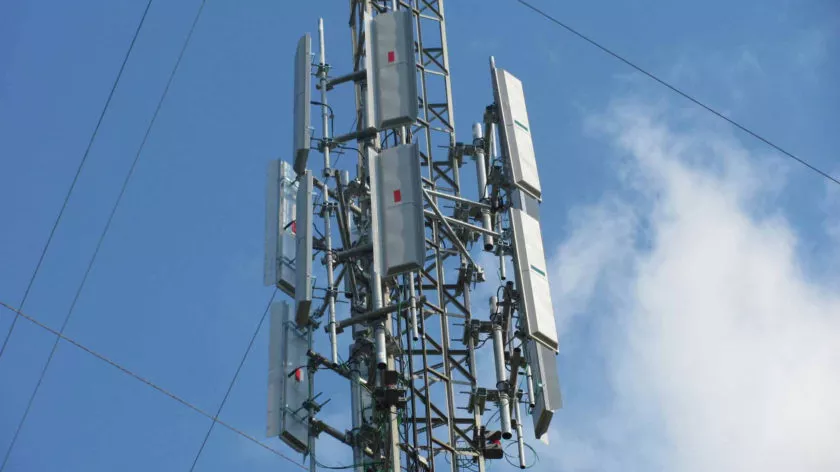Pros and Cons of Fixed Wireless Broadband Internet Access
The further you live from a town or city, the fewer home internet options you’ll have. Unfortunately, rural and remote areas often lack the infrastructure for fiber-optic internet or even traditional DSL broadband. If you do have internet access, you’ll likely pay more for slower speeds.
One of the better options available to rural users is fixed wireless internet. Unlike fiber-optic or cable internet, which rely on underground or aerial wiring, fixed wireless internet operates differently. It uses a base station that transmits data over radio waves to a receiver at your home.
ad

How Does Fixed Wireless Internet Work?
If you opt for fixed wireless internet, your internet service provider (ISP) will install a small antenna or receiver on your property, typically on the roof or a pole. This receiver establishes a direct connection to a nearby wireless base station. From there, a cable runs from the receiver into your home, delivering internet access through a wireless router.
Why Is Fixed Wireless Internet Popular in Rural Areas?
ad
Fixed wireless internet is especially common in rural and underserved regions where installing fiber-optic or cable infrastructure is cost-prohibitive. Running underground or aerial cables over long distances requires significant investment, which isn’t always financially viable for internet providers in sparsely populated areas.
By leveraging existing wireless towers, fixed wireless providers can deliver broadband speeds without the need for expensive infrastructure.
Pros and Cons of Fixed Wireless Internet
Like any internet technology, fixed wireless internet has advantages and disadvantages. Let’s break them down.
Pros of Fixed Wireless Internet
✅ No Need for Physical Cables – Unlike DSL, cable, or fiber, fixed wireless internet doesn’t require extensive physical infrastructure, making it easier and faster to deploy.
✅ High Data Limits – Many fixed wireless providers offer either very high data caps (100GB or more) or no data caps at all, unlike satellite internet.
✅ Fast Download Speeds – Some fixed wireless internet plans offer download speeds comparable to DSL or even fiber in certain areas.
✅ No Phone Line Required – Unlike DSL, fixed wireless internet operates independently of landline phone service.
Cons of Fixed Wireless Internet
❌ Weather Sensitivity – Rain, fog, and storms can disrupt or slow down your fixed wireless connection.
❌ Line of Sight Requirement – Your receiver needs an unobstructed line of sight to the nearest base station. Trees, hills, or buildings can degrade or block the signal.
❌ Higher Costs – Fixed wireless internet is often more expensive per Mbps than traditional broadband options.

Fixed Wireless vs. Satellite Internet
If fixed wireless internet isn’t available in your area, satellite internet is another option. However, there are some key differences:
| Feature | Fixed Wireless Internet | Satellite Internet |
|---|---|---|
| Technology | Uses radio signals from a nearby base station (within ~10 miles). | Uses signals from a satellite 20,000+ miles above Earth. |
| Weather Impact | Affected by local weather conditions but less than satellite. | Severe weather (even in other regions) can disrupt service. |
| Latency (Lag) | Low latency (good for online gaming and video calls). | High latency (causes lag in gaming and video streaming). |
| Data Caps | Often higher caps or unlimited. | Strict data caps (especially with traditional providers). |
| Price | Generally more affordable. | More expensive, especially for high-speed plans. |
A major change in satellite internet is Starlink, the low-earth orbit (LEO) satellite internet service developed by Elon Musk’s SpaceX. Unlike traditional satellite services, Starlink promises lower latency and higher speeds, making it a more viable alternative to fixed wireless in the future.
How Much Does Fixed Wireless Internet Cost?
Pricing for fixed wireless internet depends on your location, provider, and data plan. Here are some common fixed wireless providers and their pricing:
- Starry Internet – Offers up to 200 Mbps for $50/month in select urban areas.
- AT&T Fixed Wireless – Available in 18 states, but limited to 10 Mbps for $60/month.
- Rise Broadband – Covers 40+ states with plans starting at $56.95 for 250GB and unlimited data plans near $100.
In general, fixed wireless is more affordable than satellite internet but tends to be more expensive than fiber or cable when available.
FAQ’s
1. What Is a Fixed Wireless ISP (WISP)?
A WISP (Wireless Internet Service Provider) is a company that delivers broadband internet via wireless signals instead of wired infrastructure. WISPs provide reliable internet to rural homes, farms, and businesses.
2. How Does Fixed Wireless Internet Differ From Fiber or DSL?
- Fixed wireless internet uses radio signals to connect your home to the internet.
- Fiber-optic internet delivers data through light signals in glass cables, offering faster speeds but requiring expensive infrastructure.
- DSL internet relies on copper phone lines, often resulting in slower speeds than fixed wireless.
3. How Reliable Is Fixed Wireless Internet in Bad Weather?
While heavy rain, fog, or strong winds can weaken your connection, a well-installed system with a clear line of sight remains stable in most weather conditions.
4. Does Fixed Wireless Internet Work for Online Gaming?
Yes, but it depends on latency and signal strength. Fixed wireless generally offers lower latency than satellite internet, making it suitable for gaming and video streaming.
5. What Equipment Do I Need for Fixed Wireless Internet?
- A receiver/antenna installed on your property.
- A wireless router to distribute the connection within your home.
- Ethernet cables (if you prefer wired connections for gaming or work).
6. Can I Use Fixed Wireless Internet for Streaming Services Like Netflix?
Yes, fixed wireless internet supports streaming, but your speed and data limits will affect performance. Plans with higher speeds and no data caps are best for HD or 4K streaming.
7. Is Fixed Wireless Internet a Good Alternative to Satellite Internet?
Yes. Fixed wireless has lower latency, fewer data restrictions, and is generally cheaper than satellite internet. However, satellite is sometimes the only option for extremely remote locations.
Final Thoughts: Is Fixed Wireless Internet Right for You?
Fixed wireless internet is a great option for rural areas, offering faster speeds, lower latency, and better pricing than satellite internet. However, it does have line-of-sight requirements and can be affected by weather.
If you have access to fiber or cable internet, those will usually be the better choices. But if fixed wireless is available, it’s a strong alternative to DSL and satellite internet.
ad


Comments are closed.